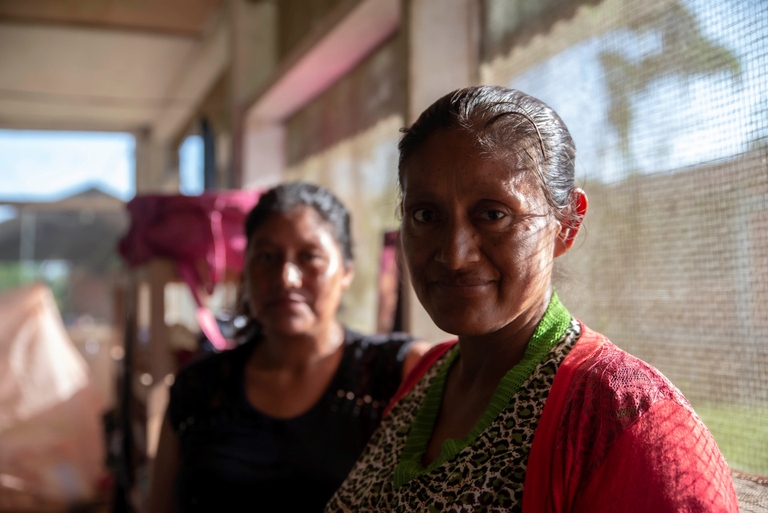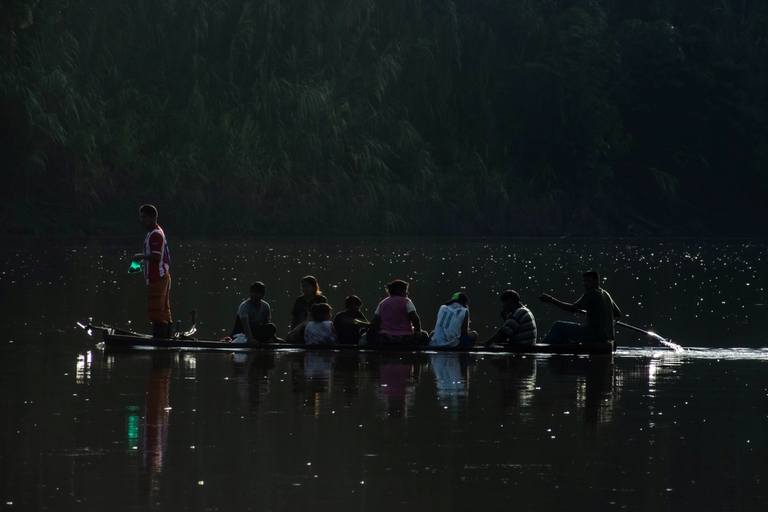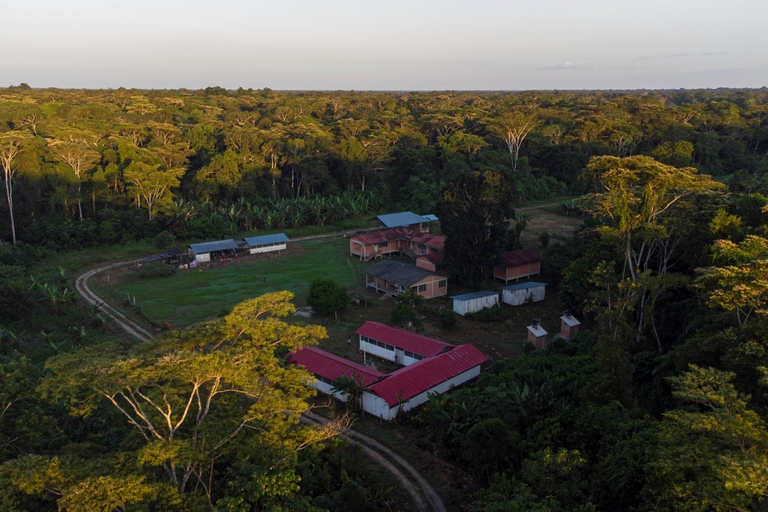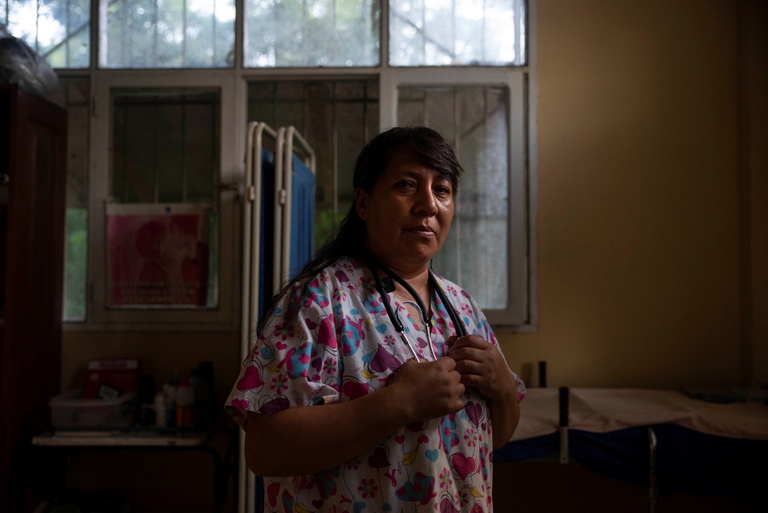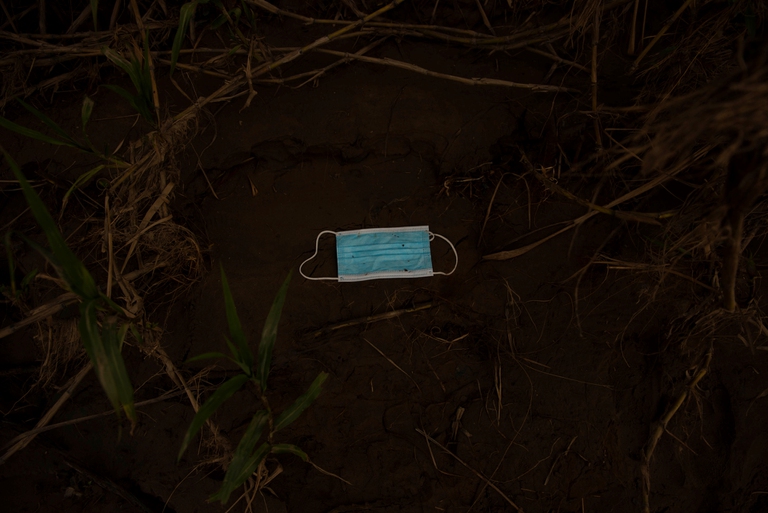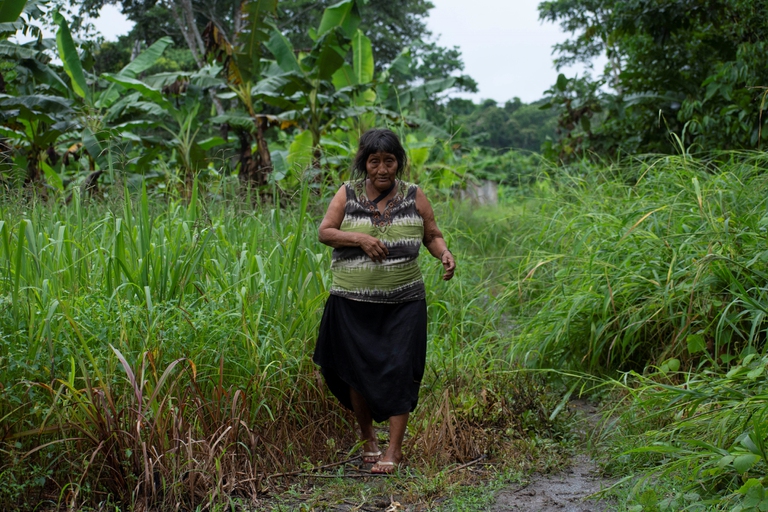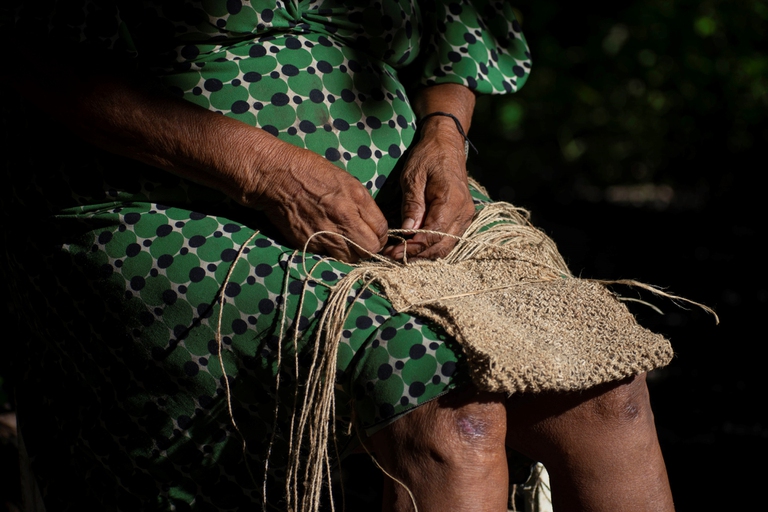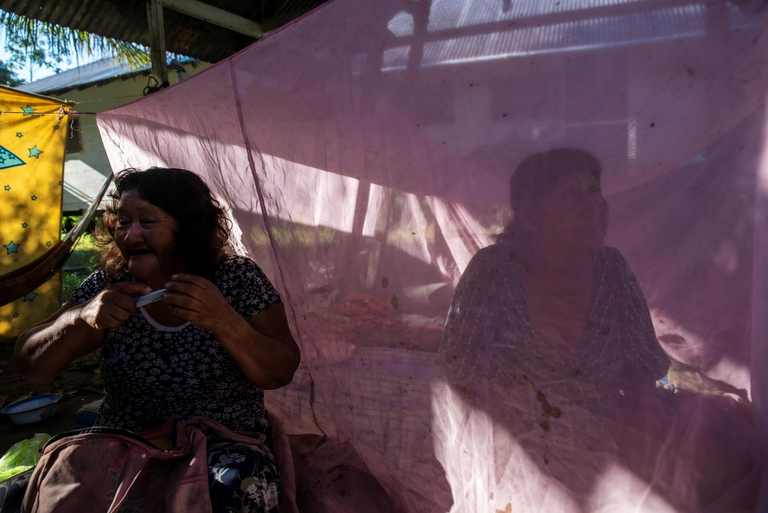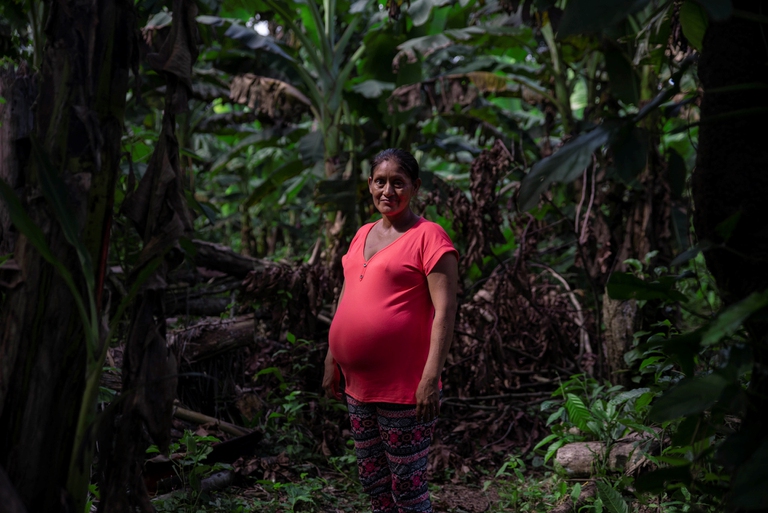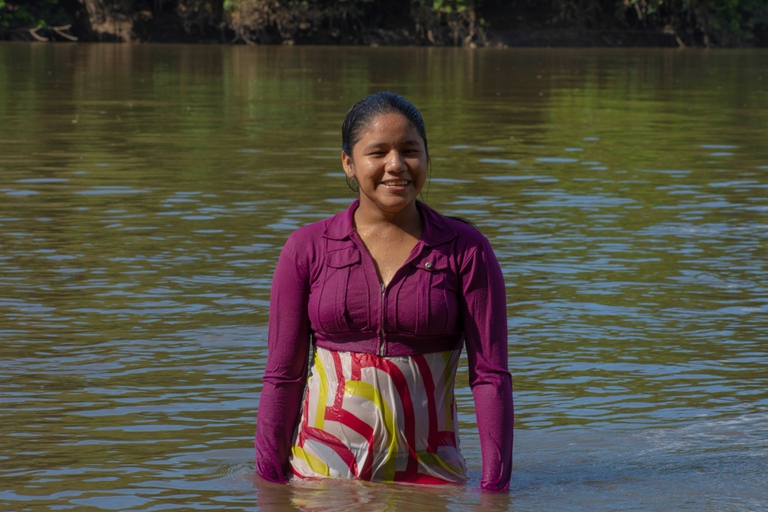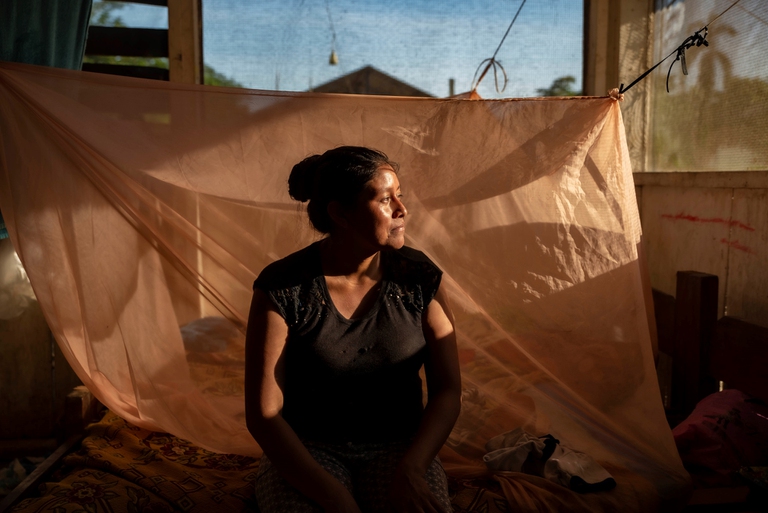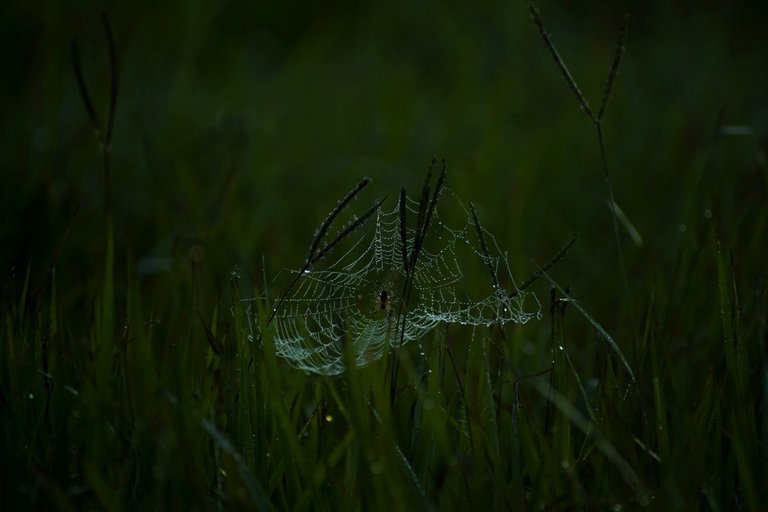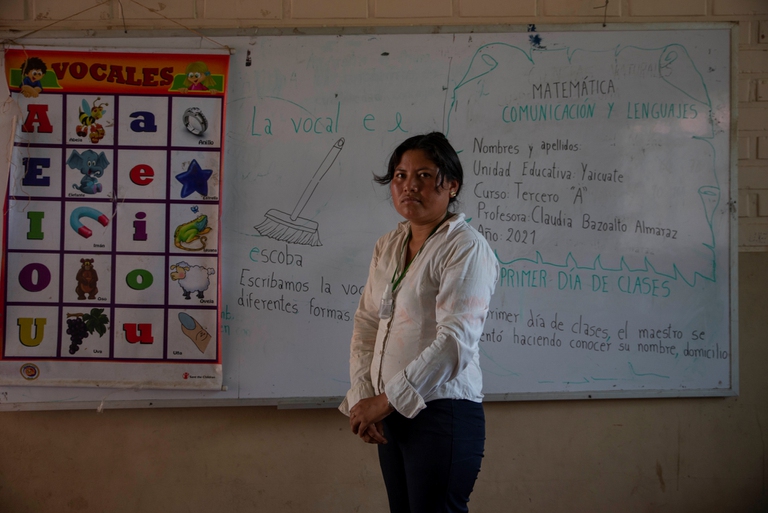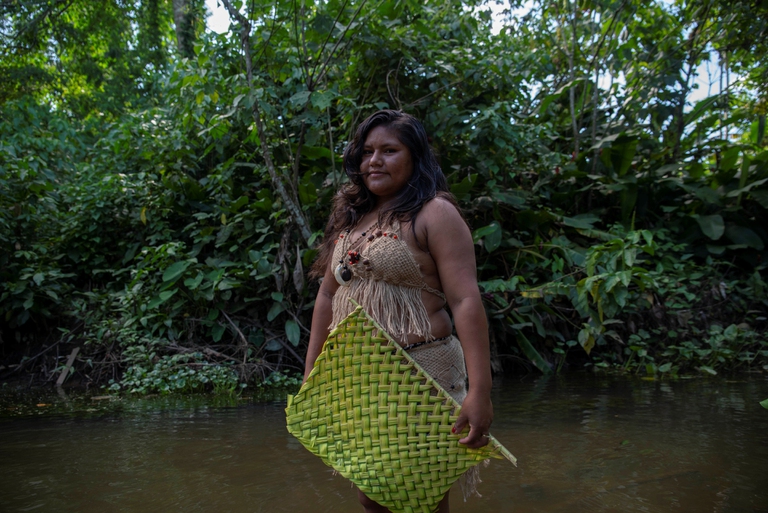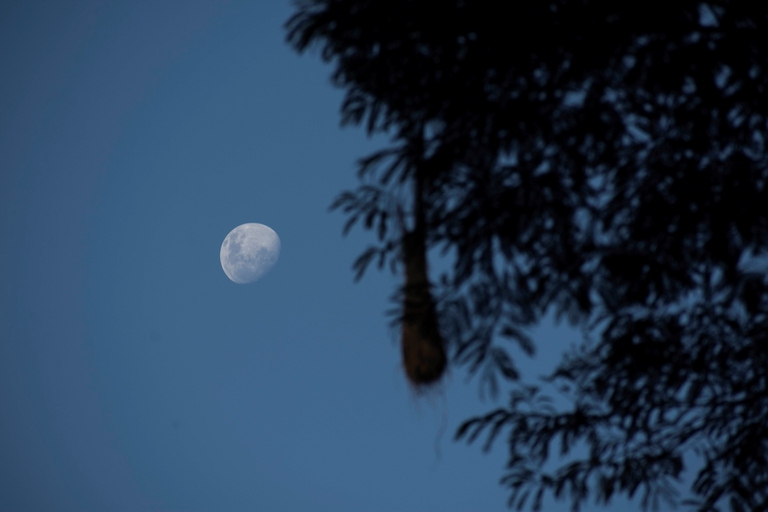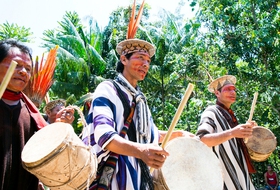
The Yuqui people of the Bolivian Amazon fight not only to survive in the face of settlers, logging and Covid-19, but to preserve their culture and identity.
A special report from the Yuqui territory delves deep into the dreams, challenges, joys and sadness of one of Bolivia’s most vulnerable indigenous groups.
“When thunder, lightning and water come, my grandmother cries gravely. She remembers my mum. When we lose our family, we remember. When it’s windy, we remember everything. When we don’t have our relatives by our side and or when we hear thunder, we cry and sing sadly. Our grief doesn’t pass quickly. When our relatives die, we don’t eat, we don’t want to drink water, that is our custom as Yuqui,” says Carmen Isategua, 35, former cacique, or leader, in the community of Bia Recuaté in the heart of the Bolivian Amazon.
Now a baby in her belly leaves her no energy for her work as a community leader which has occupied the last five years of her life.
When the sky cries, the Yuqui cry with it. When the storm water falls, the Yuqui are sad. Yuqui sadness. The grief and memories of the dead that we all have; our dead.
The Yuqui people from the Bolivian Amazon are one of the smallest indigenous populations in the country, with only 346 people. They live mainly in Bia Recuaté in Carrasco province, about 260 kilometres from the departmental capital of Cochabamba. Others have migrated to the town of Chimoré, which is about two hours drive away.
Once leading nomadic lifestyles, the Yuqui have only recently begun living in houses and been in contact with the outside world, plunging them into a social and cultural limbo. In this context, we meet several generations of women, who talk through tears that come from a place of deep sadness.
This tribe has always been known – and feared – for being warriors. The former cacique says it’s better for abba, which in the Yuqui language Biaye means a person from outside the community, not to approach the Yuqui when there’s a storm.
“In that moment, the tribe wants to find someone to do evil things to. We want to use the arrow. Abba have killed our relatives before, and remembering that, in that very moment, the Yuqui want to find the collas (indigenous people from the highlands) and kill them. Outsiders are afraid of our arrow; we have the habit of using it when they don’t listen. Our arrow is silent, in silence it can kill people without noise. If a Yuqui dies, three collas must die,” says Carmen.
One of our first impressions of the Yuqui is at a communal meeting called by Abel Iaira Guaguasu, 35. He doesn’t have an official position in the community but is a leading figure for the people, having been raised by the missionaries of the New Tribes Mission, now known as Ethnos360, based in the United States. It was with this mission that the Yuqui had their first contacts with outsiders in the 1960s and who, together with the Bolivian state, was responsible for transferring the tribe by plane to this place in the jungle, now called Bia Recuaté, in 1989. It is Abel who opens the doors for us to visit the Yuqui in their community; they’re cautious and usually don’t receive strangers.
On our first day, Abel summons everyone to a communal meeting where a new cacique will be elected. They also discuss how some Colombians killed two people in the territory recently and their concerns about drug trafficking and robberies.
After the meeting, we try and find Carmen, but time and appointments follow a different logic here. “Maybe Carmen is over there, I think I may have seen her,” some neighbours say. There’s no cell phone signal to call her. We walk for almost an hour in the burning sun to visit her house in the jungle. Never in my life have I seen so many varieties of butterflies of all colours in the same place. The magic of the jungle distracts me. Bia Recuaté is a mix between beauty and sadness, between intensity and sleepiness. Carmen isn’t at home; we wait for her to appear.
Two years ago, Doctor Gimena Torrico entered Bia Recuaté for the first time. She hadn’t met any Yuqui at the time and remembers it as a very big question mark. She tells us that before her, other doctors had escaped using the river or left with the same transport that dropped them off in the community: they didn’t want to be with the Yuqui. While Gimena had to stay for two weeks, the rest of the health personnel had left. She was alone.
“Those two weeks were the cruellest of my entire life. I’ve always been very strong, and I like adventures, I love traveling. Those two weeks I was in this house where there were many rats and I was alone, completely alone. The people seemed wild to me at times. There’s no light and I didn’t bring candles, just my cell phone, which was running out of battery. Sometimes I would listen to a song and then turn it off so I wouldn’t feel alone. It was very, very hard. I told myself that I wasn’t going to cry and I wasn’t going to despair, because if that happened, there was no one who would say a word of encouragement to me”.
Over time, the doctor adapted. “Then I decided I must change perspective. I began to tell myself, ‘the sun’s so beautiful. These little birds, how cute’. From that moment onwards everything changed for me. When I returned, the next month, I adjusted. But the first few weeks, I had never suffered so much in my entire life. It’s a nice thing to remember because I got over it and feel very brave. I can achieve anything”.
Those two weeks were the cruellest two weeks of my entire life… Then I decided I must change perspective.
As if by spending a lot of time with the Yuqui, the sadness and memories of her dead also reached Gimena. “The most difficult thing that ever happened to me was the death of my husband. We had a nice family. But of my professional life, this here was the hardest. Since, I’ve started accepting everything. At first, I said to God, ‘why have you punished me?’ Until I changed my mind and said, ‘thank you for blessing me by getting to know this place’. Could you imagine such a place exists? Nobody can,” Gimena recalls.
Since Gimena was transferred here a socio-political crisis, which began in 2019, has hit Bolivia. Then the pandemic. Then landslides and floods.
Gimena is originally from the city of Oruro, about 100 kilometres southwest of Cochabamba, were she now lives, spending about half her time in Bia Recuaté with the Yuqui. Coming from outside, she feels strong clashes with this people’s different ways of thinking and being. Having started relations with the outside world only recently, anthropologists still consider them to be in a state of “initial contact“. For example, the concept of time is different. You can’t tell the Yuqui to take a pill at a specific hour or day, or that you expect them at a specific time.
“As soon as we found out about Covid-19, I thought these people were going to disappear! We were told that the risk from the virus increases and can be fatal combined with basic diseases. And here, the majority of people suffer from malnutrition, tuberculosis or anaemia”.
Fortunately, however, the situation hasn’t been as serious as the doctor feared. So far, there have been 23 cases of people testing positive for Covid-19.
Tuberculosis, in fact, remains one of the doctor’s greatest concerns. “Every year, it kills in great numbers. It’s the disease of the poor. Where many people live together, food hygiene and general cleanliness are also very bad. All this makes the disease prevalent among Yuqui. It’s a terrible disease which in most of Bolivia has been eradicated, but here it’s the daily bread. Since the water isn’t drinkable, parasites, anaemia, malnutrition and cases of mycosis are also prevalent”.
In other words, the community is facing serious health problems.
This level of vulnerability isn’t unusual for peoples in the stage of initial contact, and has been observed throughout the Amazon, as they don’t have antibodies for diseases that are common outside of their communities.
I meet Rosa Isategua Guaguasu, 72, sitting in a woven hammock. In her family, everyone suffers from tuberculosis and coughs a lot, all the time. Rosa has a sweet and nostalgic look in her eyes. She still remembers the time before being transferred to Bia Recuaté. Her story flows between Spanish and Biaye, and I try to follow.
“I used to live in the jungle. There was so much fruit to eat. All the people were picking fruit and we didn’t suffer to get food. People stole bananas to eat. We slept quietly outside, in hammocks only as there were no beds. There was meat: monkey and wild boars. Men hunted”.
The Yuqui sadness soon comes to her, and her eyes get wet. “My husband has left us. And my son, my mum, my sister. They went to the house of Jesus. I’ve suffered a lot. I miss my mum and my sister. My slave also died”. When the Yuqui lived in the jungle, it was common to have slaves, Rosa tells us.
Peasants’ robberies of the ended up in serious conflicts, even deaths, both for both the Yuqui and settlers. The clash between living freely in the jungle like the Yuqui once did and the concept of private property imposed by colonists’ “modern” society was, and still is, very strong.
Rosa says that she came to Bia Recuaté with her firstborn and husband and talks excitedly about the Yuqui who are still living in voluntary isolation, that is, without having contact with the outside world. “There are barbarians in the jungle. My son saw them when he went to bathe in the river. They were collecting honey and were very close! They had a backpack to carry bananas”.
While we speak, Rosa is weaving a bag with yarn made from ambaibo tree fibre. With the innocence of an outsider, I ask her who has taught her to make the handicraft, hoping that she would talk about her family. “Teresa. A gringa (foreigner),” she answers.
What defines the Yuqui? What is their culture today? Everything transforms, our cultures aren’t immutable.
We’re interrupted by Rosa’s son who arrives, very drunk, and kicks us out of the house. We leave. Another day we meet Rosa smiling, harvesting the coquino fruit, the food of the day, with other women. The Yuqui still maintain their hunter-gathering customs and connection with the surrounding jungle.
Gimena also tells about “the barbarians,” the Yuqui who live in voluntary isolation. She’s afraid of them, and their presence makes her stay inside after dark.
A study by Bolivian anthropologist Ely Linares estimates that there are three or four Yuqui families, for a total of about twenty people, who remain in voluntary isolation. Around the world, there are around 100 groups living in voluntary isolation, the vast majority of which are in the Amazon, especially in Brazil, as well as in Colombia, Venezuela, Ecuador, Peru and Bolivia.
The night in this remote community would intimidate, scare and impress anyone. Dreams in Bia Recuaté are heavy. One night I dreamed that my parents were going to send me to an orphanage because they couldn’t take care of me. I was just a small child and the dream was so vivid that I was left to ask myself whether it was real. Was it not a dream but a distant memory? The whole day I was imbued with deep pain.
Could it be that I had internalised the Yuqui sadness, the feeling of being abandoned and of not belonging?
Gimena is sometimes frustrated because the villagers ignore her and feels that they don’t take their health seriously. “They don’t like to be told off. But sometimes one needs to speak harshly to them, especially if it’s about their health, because it’s their life. We’re talking about the most important thing that human beings have: their life”.
The doctor tells us how the whole village got angry with her because a woman had died in the ambulance on the way to hospital. And things were getting ugly, until Abel came to her defence. “That day I was ready to go. They wanted to lynch me, and it wasn’t my fault. It usually takes about four hours to get to hospital after calling an ambulance. It’s terribly hard when things like that happen”.
Now Gimena is worried about Carmen, who wants to have her baby at home. “If something happens, she can bleed out on the way to hospital and both she and her baby can die”.
She’s also saddened when remembering how a young child died from severe malnutrition and anaemia. She had tried to convince the parents to take him to a hospital outside of the community, but they didn’t want to, and the boy died. “I cried a lot. I loved that boy very much. I decided to undertake this career not to earn millions, but to help people. People die because they’re poor and because they don’t know any better. If you don’t have money, you die, because there’s no way to pay what it costs to get well”.
“For me, working with the Yuqui is a great blessing. I’ve learned thousands and thousands of things with them. I consider them my family,” says Gimena, telling us how she misses them when she’s away, and how she always calls them on their birthdays. “They don’t know they have birthdays because I’m the only one who knows about these things“.
One day, a communal roadside cleaning is organised. Carmen has an appointment with her doctor for her pregnancy on the same day. “I’m worried. But I couldn’t miss this community gathering,” she explains. “I’ll make another appointment”.
For the former cacique, the management plan for the territory’s protection is especially important. “(Because of it) the settlers respect us. Without a management plan, they can enter our territory at will. They really wanted our territory, so we put together a management plan so that they don’t circulate within it and so they don’t plant coca”.
The former cacique is a strong woman, her Yuqui warrior spirit is clearly perceptible. She hasn’t hesitated to confront drug traffickers or others interested in the territory. “We’ve already received threats from them. They said they’re going to kill us. I’ confronted outsiders so that no more illegal things enter here, I was serious about this when I was a leader. That’s why sometimes, when they don’t want to listen, we’ll go to them armed with our arrows, that’s our custom,” says Carmen.
She also talks about the Yuqui in voluntary isolation. “We don’t know them, but they live within our territory. They’re our Yuqui relatives”.
Apart from the fact that the territory is important for the survival of the Yuqui themselves, designating indigenous land is also key to protecting forests. According to a recent report by the Food and Agriculture Organisation regional office for Latin America and the Caribbean, the indigenous peoples of Latin America are the best guardians of the region’s forests with deforestation rates up to 50 per cent lower in their territories compared to other areas.
Naty Belén Guaguasu Guasu, 15, is in her fourth year of secondary school in Bia Recuaté along with 79 other boys and girls. The community also has a boarding school that is financed through the sale of the wood that falls under the territorial management plan. About thirty children live in the boarding school. Some are orphans who have lost their parents, in particular to the tuberculosis epidemic, others have parents who work outside of the village and prefer to leave the children there so that they remain within the community.
“I’m proud to be Yuqui, why should I be ashamed of living here?,” Naty Belén posits. “I don’t speak Yuqui so well because my mother didn’t teach me. I only know what I learnt from my grandmother, who has already passed away”.
It isn’t long before nostalgia and the memory of death also reach the teenager. “My two cousins died last year in a motorcycle accident: Jaquelin and Nancy, they were my age”. She lowers her voice when she names them. The Yuqui shouldn’t pronounce the names of the dead.
“When a person dies, they all come. They have another way of crying but I don’t know how to cry like them. They speak in our language and cry like a song. My grandfather Lorenzo cries like this. And when the frogs cry it’s going to rain, they say”. As I speak with Naty Belén, the sky cries too.
Lack of electricity is an important issue for the 15-year-old. “There’s no light, only candle or flashlight. The antenna also needs to be cleaned because there’s no signal,” she says, pointing to something that looks like a tree but turns out to be an antenna for internet reception.
All the women sing to me in Biaye. They sing Christian songs. Even these speak of sadness: “May you be happy and never sad, because Jesus lives, don’t be sad,” they translate them for me. The legacy of the New Tribes Mission, which left the community in 2005 when the Bolivian government withdrew their permission to work with the Yuqui, still feels strong. I ask Dina Ie Guaguasubera, 27, the cook at the boarding school, about the songs.
“My community was better off before. Now I see it as being very sad. The language is what worries me the most. When I was a child, my mum and dad taught me to speak Biaye. I’m afraid to lose my language because today’s children only speak Spanish. Even my children don’t know how to speak it. They understand it, but don’t speak it. It’s very important that they learn to speak, because we’re few and we could lose the language to the point that no one speaks it anymore. If that happens, it will be as if the Yuqui don’t exist anymore. Maybe I’ll die and my children won’t have learnt it”.
Anthropologist Linares calculates that some three quarters of the Yuqui speak Biaye. According to Unesco’s classification, the Yuqui language is in serious danger of extinction.
Dina tells us how they sometimes suffer discrimination when they go to the town of Chimoré. “The outsiders speak badly of us, they say the Yuqui are filthy and lazy. When we’re eating they say: ‘Why do they eat on the street, why don’t they go home or eat at a table?’ This is how they look at us. But some of our people work outside to earn a living. They have to eat, and they don’t have homes there”.
In Chimoré, this strong perception of the Yuquis is palpable. A man tells us that a couple of years ago the town wanted to remove all the Yuqui because they steal food from people’s plates in the market, sleep on the street and don’t respect society’s basic rules of coexistence.
I contemplate what it would be like for us, if we had to live like nomads in the jungle as the Yuqui used to. It’s hard to imagine such a drastic change in lifestyle. Is that why the Yuqui feel such sadness? They don’t belong either here nor there.
These are strong clashes between different values and ways of living. Situations that are seen with other peoples in recent contact, such as the Nukak people of Colombia whose territory has been invaded by settlers and coca farmers.
Another complex issue with peoples in initial contact like the Yuqui is addiction. Be it to sugar, alcohol or drugs – legal and illegal.
Dina tells us that she and her husband had problems with alcohol less than a year ago. “When I was younger, I was a party girl and I liked to drink. My husband would come home drunk, and he hit me ugly. I also hit him with a stick and everything. But we decided that we should change our lives. We’ve reconciled with the Lord. I no longer go to parties, my husband no longer drinks and we’re calm with our children. About half a year ago, we stopped drinking”.
The couple have five children, and she had the first one when she was 14 years old. Child mothers are normal in the Yuqui community. And it isn’t uncommon for the father to be from the same family.
“The girls aren’t in anybody’s care; they’re just out on the street and anything can happen. It seems that the same is true for adult women. This is normal. It’s part of their culture, which may even shock us. But it’s the way it is,” Gimena says, worriedly. “There’s a lady who has six fingers, others have intellectual deficiencies because they were born out of incest. Their parents are siblings or cousins”.
Claudia Bazoalto Almaraz, 30, is a teacher at the primary school in Bia Recuaté. She remembers when she arrived more than three years ago. “It was sad to see them. They always left, they didn’t stay here. I always saw them in town (Chimoré). They wanted to forget about their culture. Teachers have worked a lot to raise awareness about valuing their community, culture and language“.
Every afternoon, the teacher goes to the river to bathe and wash clothes. Here, she sees a beautiful landscape, often illuminated by spectacular sunsets. But she also goes there due to a lack of basic services, including electricity and drinking water. “They still lack all this. They have the right to have electricity, to live comfortably. Due to the lack of basic services, they emigrate to town, where there are light and water, so they prefer to be there”.
Last year, the first two students graduated from Bia Recuaté’s high school, and the entire community was proud. When they see them in Chimoré, they say: “Look, there are our high school graduates”. It’s a great achievement for the Yuqui. But the teacher is worried nonetheless as there’s a problem with school attendance among girls. “Teenage girls are dropping out of school. They think they must start a family and that studying isn’t so important. Some of the 13 and 14-year-olds are already pregnant”. Claudia also speaks sadly of three orphan sisters who sell one of the sisters’ body to men in Chimoré.
Irma Guasu Guaguasu, 25, was recently elected Yuqui councillor for the municipality of Puerto Villarroel, which Bia Recuaté is a part of. Representing her people, with pride and a bit of nerves as well, she wears her traditional woven Yuqui clothing. She fights to improve her people’s living conditions and wants the Bia Recuaté community to succeed. The leader is working to get electricity and drinking water to her community.
“We should be proud to be the only ones, the only Yuqui who exist. There aren’t any more! We must have electricity and water for all of our people to live in the community. Often, that’s why we leave. Because there’s no water, we get sick, and people no longer want to live in darkness. I wish that someday light will come. My dream is to enlarge the community”.
Because there’s no water, we get sick, and people no longer want to live in darkness. I wish that someday light will come. My dream is to enlarge the community.
“My father was a hunter,” Dina, the boarding school cook, recalls. “He hunted monkeys with bows and arrows. He also had a riffle. He brought us fruit, honey and meat from the bush. My dad was a good guy. But he died. He drowned in the river recently. Everything was prettier when I was a child. Now my community looks sad because most of the people have left. They’ve left their home, their community”.
But during the pandemic, many Yuqui have actually returned to Bia Recuaté to protect themselves.
“I was happy. It was nice to see the river full, everyone fishing. They ate well. We went to the river and a lot of people went bathing. I was happy because all my people have come in the time of the pandemic”.
Dina’s dream is for her children to become professionals. “I want them to help the community. I dream that one day there will be a good road, that there will be a square and a shop. That the community will improve. ‘Just imagine,’ I tell my children. ‘I can imagine it, mum. There will be a square, mum, when you become a grandmother’, they reply”.
This story was produced with support from National Geographic’s Covid-19 emergency fund for journalists.
Siamo anche su WhatsApp. Segui il canale ufficiale LifeGate per restare aggiornata, aggiornato sulle ultime notizie e sulle nostre attività.
![]()
Quest'opera è distribuita con Licenza Creative Commons Attribuzione - Non commerciale - Non opere derivate 4.0 Internazionale.
The Yuqui people of the Bolivian Amazon fight not only to survive in the face of settlers, logging and Covid-19, but to preserve their culture and identity.
Jair Bolsonaro is accused of crimes against humanity for persecuting indigenous Brazilians and destroying the Amazon. We speak to William Bourdon and Charly Salkazanov, the lawyers bringing the case before the ICC.
Activists hail the decision not to hold the 2023 World Anthropology Congress at a controversial Indian school for tribal children as originally planned.
Autumn Peltier is a water defender who began her fight for indigenous Canadians’ right to clean drinking water when she was only eight years old.
The pandemic threatens some of the world’s most endangered indigenous peoples, such as the Great Andamanese of the Andaman and Nicobar Islands in India.
The Upopoy National Ainu Museum has finally opened. With it the indigenous people of Hokkaido are gaining recognition but not access to fundamental rights.
A video shows the violent arrest of indigenous Chief Allan Adam, who was beaten by two Royal Canadian Mounted Police (RCMP) officers.
On top of a 2.4 million dollar compensation, the indigenous Ashaninka people will receive an official apology from the companies who deforested their lands in the 1980s.
